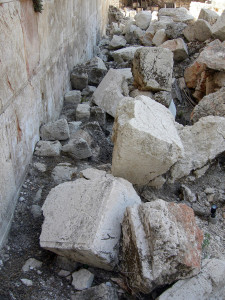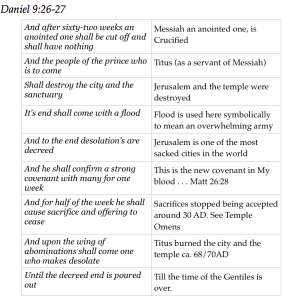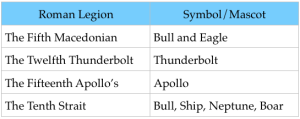“So when you see the desolating sacrilege spoken of by the prophet Daniel, standing in the holy place (let the reader understand),” Matt. 24:15
“But when you see the desolating sacrilege set up where it ought not to be (let the reader understand), then let those who are in Judea flee to the mountains;” Mark 13:14
“But when you see Jerusalem surrounded by armies, then know that its desolation has come near.” Luke 21:20
When You See
The disciples understood that their generation of the Jewish nation was to pay for all the sins that had come before them. God had not forgotten any of the prophets that Israel had rejected; nor will He forget His covenants.
The Desolating Sacrilege
The passage says that a desolating sacrilege would be seen as a warning to believers to flee the city. The Lord places the context of Matthews’ desolating sacrilege in Daniel 9. In the parallel accounts, Mark also uses the term desolating sacrilege where Luke says armies will surround Jerusalem.
The Hebrew word for desolation is shamen; meaning be desolate, appalled, a devastation, a ruin. It is not, as some believe, exclusively an idol or idolatry. It can be, but Daniel and Luke have identified armies surrounding Jerusalem.
and the people of the prince who is to come shall destroy the city and the sanctuary. Its end shall come with a flood, and to the end there shall be war; desolations are decreed. Dan. 9:26b
and upon the wing of abominations shall come one who makes desolate, until the decreed end is poured out on the desolator.” Dan. 9:27b
Abomination of Desolation
Three abominations cause desolation found in Daniel’s prophecies, and because of this some commentators have become confused as to which destruction in Daniel is being referred to.
- In Dan 11:31 “Abomination that makes desolate” is about Antiochus Epiphanes and Judas Maccabee and was fulfilled in 167 BC.
- Daniel 12:11 mentions the “abomination that makes desolate” but there is no mention of armies.
- The Lord could only have been referring to Dan 9:26-27. It is only here that both the “desolating sacrilege” and armies are mentioned as also in Luke’s version.
An abomination in Hebrew is shiqquts, a detested thing. Is often used for any sacrilege against God, His people, the nation of Israel, the city of Jerusalem, the temple, the ordained ritual sacrifices, or the priesthood. In some other cases where abomination is used alone, it pertains to idols or shrines. I King 11:7; II Kings 23:13; Jer 4:1; 13:27; Ezek 5:11]
FYI: The Futurists would put Antichrist here, but it is Dan 11:31 that is believed to be typical of antichrist. However, it is Luke 21:20 and Dan 9:26-27 that have “armies” and are therefore parallel prophecies.
Historical Fulfillment
In less than 40 years after the Olivet Discourse, Four Roman legions led by then-General Titus (future Emperor) would surround the city in one of the most horrible sieges in history. They would destroy the temple and raise their standards on the ruins of it. Josephus records that more than 1.1 million people (most of them Jewish) were killed, and 97,000 were captured and enslaved.
“And now the Romans, upon the flight of the seditious into the city, and upon the burning of the holy house itself, and of all the buildings lying round about it, brought their ensigns to the temple, and set them over against its eastern gate; and there did they offer sacrifices to them, and there did they make Titus imperator, with the greatest acclamations of joy. Josephus, War book VI; chap 6; sec 1
At the Lord’s trial, Caiaphas the High Priest questioned Him as to His claim of being the Messiah, the Son of God. Messiah told him that they would see the Son of Man on the right hand of power and coming in the clouds of heaven [Zech. 13:7; Matt 26:63-68]. The phrase on the right hand of power is an Old Testament idiom for the power and authority of God.
FYI: The Greek word horao, to see: ‘to see to it that something happens, to arrange for something to happen.
Caiaphas understood the Lord’s claim as the I Am, to be equal to God, for he then tore his clothes claiming Messiah was speaking blasphemy. Caiaphas understood the meaning of the Messiah’s words quite clearly as they came from Zechariah 13:7. The word you in this Matthew 24 passage, is in the plural form of the Greek. It is best understood that He was not just speaking to Caiaphas but, to the entire Sanhedrin.

Stones from the Western Wall of the Temple Mount (Jerusalem) thrown onto the street by Roman soldiers on the Ninth of Av, 70
Although Caiaphas did not personally live long enough to physically see the destruction of Jerusalem, or the Son of Man coming in the clouds, many of those in that room did.
The 1st Century historian Josephus recorded that some of the Sanhedrin survived to see something in the clouds at the time of the destruction of the city.
“for, before sun-setting, chariots and troops of soldiers in their armor were seen running among the clouds, and surrounding of cities.” Josephus’ War book VI; chap 5; sec 3.
Vespian’s Coming to Subdue the Jews to the Taking of Gamala. War Book III by Josephus
“Prodigies had occurred, which this nation, prone to superstition, but hating all religious rites, did not deem it lawful to expiate by offering and sacrifice. There had been seen hosts joining battle in the skies, the fiery gleam of arms, the temple illuminated by a sudden radiance from the clouds. The doors of the inner shrine were suddenly thrown open, and a voice of more than mortal tone was heard to cry that the Gods were departing. At the same instant there was a mighty stir as of departure. Some few put a fearful meaning on these events, but in most there was a firm persuasion, that in the ancient records of their priests was contained a prediction of how at this very time the East was to grow powerful, and rulers, coming from Judaea, were to acquire universal empire.” TACITUS HISTORIES Book 5
Next Post: Flee


